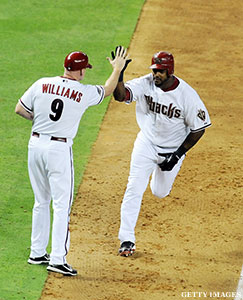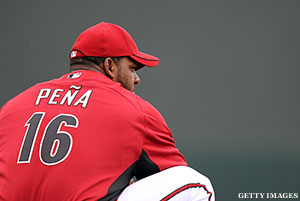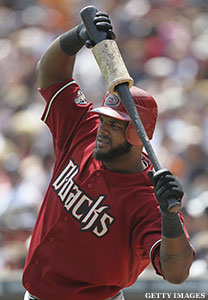
Wily Modesto Peña, better known as Wily Mo, hits baseballs for a living, which is sort of thing a 29-year-old man named Wily Mo would do. He hits them hard, probably harder than anyone alive. When dead-red fastballs meet Wily Mo's bat, his home runs do not fly. They teleport.
They end up in strange, often distant places where other baseballs wouldn't dream of going. Into remote bleacher sections, off office buildings, past railroad trenches – Wily Mo has hit home runs everywhere. Other balls just disappeared into the night, like shooting stars.
He is a Sequoia of a man, 6-foot-3 and 270 pounds, the last 20 of which came as he bounced around the minor leagues and wondered why the sport's most powerful hitter couldn't find a major league job. None of the weight gravitated to his gut; Wily Mo always has been disproportionately top heavy, all shoulders and chest and arms, even back when the legendary stories pervaded the Dominican Republic about the teenager who could hit a ball 500 feet. Myth and hyperbole trade as currencies in baseball; every scout has been regaled with a story about a transcendent talent, only to waste an afternoon watching an apparition. Wily Mo never disappointed. Even if he had an off day, he would hit one ball that still might be in the air.
"I've been fortunate in my career to see a lot of the top players," says Gordon Blakeley, the scout who signed him a dozen years ago. "I saw Ken Griffey Jr. in high school. I saw Alex Rodriguez in high school. I saw Manny Ramirez. None of those guys had Wily Mo's power. None of them."
Power has brought him sport-wide renown, just not a job. Wily Mo never hit breaking balls well, and he wasn't fleet-footed in the outfield, and his baserunning lagged, and so for the last 2½ years, he hasn't been in the major leagues. He spent the first two months of this year at Triple-A Reno and put up the best numbers in the minors. Ten days ago, the Arizona Diamondbacks needed a designated hitter for interleague play and summoned Wily Mo. Since his recall, he has hit three home runs.

By now, every pitcher in baseball should understand that when it comes to Wily Mo Peña, there is only one rule: don't throw him a fastball. Just don't. Fastballs are Wily Mo's catnip. They set atwitter the fast-twitch fibers inside of him, fire his synapses and trigger immediate regret for the pitcher. The scouting report hasn't changed for a decade.
Maybe it's because he's older, or maybe because he slummed in independent ball, or maybe because he still inspires pitchers to want to beat him. Whatever the reason, during Wily Mo's first game back, Kansas City starter Luke Hochevar threw him a second-pitch fastball in his second at-bat, a 94-mph cookie that bisected the plate. And Wily Mo hit it like Wily Mo does, true as hell, 110.8 mph off the bat, only 81 feet off the ground, a line drive that cared not to stop. It cut through the current that holds down balls at Kauffman Stadium and landed with a splash in a fountain 451 feet later.
"I didn't think it was going," Wily Mo says. "I just hit a line drive. It's a line drive."
He thinks about that for a second.
"It's not supposed to do what it did."
Wily Mo-ment No. 1: The longest official home run Wily Mo ever hit went 498 feet. Brandon Duckworth threw him a letters-high, 84-mph cutter. It's difficult to see where the ball landed. The video evidence is grainy. The best guess is 20 or so rows into the upper deck at Great American Ball Park. Though in the backdrop of the Cincinnati Reds' stadium is the Taylor-Southgate Bridge, which connects Ohio and Kentucky. And if anyone can hit a ball into another state, it's Wily Mo.
At age 16, Wily Mo agreed to a contract with the New York Mets. The scout who signed him sent the deal into Major League Baseball. It was official until the league learned it was fraudulent. The team needed the approval of Wily Mo's father, and while the contract included a scribbling that read "Felix Mo Peña," it wasn't his imprint. Felix Mo was illiterate. For his signature, he drew a crucifix.
People in baseball loved Wily Mo Peña's right-handed swing so much, they were willing to commit forgery to get him. Players with raw power like his come along once every five years or so. Mike Stanton has it. So does minor leaguer Bryce Harper. And that's about it today. Power inspires a cult, turns sound scouting minds mushy with praise. MLB declared Wily Mo a free agent, and during the ensuing bidding war, scouts and executives chased him like paparazzi.

He flew around the country and held showcases. At the New York Yankees' complex in Tampa, he cleared the outfield fence by 50, sometimes 100 feet. For the final stop, he went to Arizona and worked out at HoHoKam Park, the Chicago Cubs' spring-training site. The green batters' eye in center field stands 410 feet away and 40 feet tall, a target for only the bravest and strongest.
"Wily was taking a batting practice," says Don Nomura, his agent at the time. "There were about 25 scouts. Wily hit about eight straight balls out over the green monster in center field. I was watching the scouts' faces. They had their mouths open and their heads shaking. Drooling."
Wily Mo came along at the perfect time. For decades, MLB paid relative pennies for Dominican talent. The best players signed for $10,000. When the Yankees gave D'Angelo Jimenez a $25,000 bonus in 1994, it broke the wage scale.
Because of their success in the late '90s, the Yankees' draft choices toward the end of the first round rarely afforded them star-level talent. Owner George Steinbrenner told Blakeley, the international scouting director, to spend what he needed to in Latin America. After Wily Mo's shows in Florida and Arizona, Blakeley met Nomura's request for a major league contract – which gave Peña a precious spot on the 40-man roster as a 17-year-old – and signed him for $3.7 million, including a $2.44 million bonus.
Four years after Wily Mo dropped out of school, he was a multimillionaire. His father was a farmer who never held steady work. To help pay rent, Wily Mo had milked cows at 4 a.m. before finding a pickup game in Laguna Salada, his small hometown, where he would play the rest of the day.
The Yankees groomed him for stardom. Players from Latin American countries went to English class once a day. Wily Mo went three times daily. He was handsome, smart, charming, the sort whose face would fit in with Derek Jeter's on a billboard.
"They were the Yankees. They wanted everything to be perfect," Wily Mo says. "They figured I was going to be around for a while."
He lasted just two years with New York. He struck out too much. His contract stipulated he arrive in the major leagues by 2003, and the Yankees worried he wouldn't be ready to join a championship-caliber club. They sent him to Cincinnati for Drew Henson, himself a powerful and underachieving talent.
Wily Mo thrived in 2001, his first season with in the Reds' system. He hit 26 home runs, a number of which bounced over East Monument Avenue in Dayton and ricocheted off a nearby building. He played well for a 20-year-old in Double-A the next year. By '03, he was in Cincinnati. He still hadn't learned how to hit a breaking ball. He still took circuitous routes to fly balls. And he still hit home runs longer than anyone, even his batting-practice compatriots Adam Dunn and Griffey.
The closest thing Wily Mo ever had to a full season came the next year. The Reds gave him 336 at-bats. He hit 26 home runs. He was 22. Nobody that young ever hit so many home runs in so few at-bats. His 108 strikeouts were the price of doing business. He was going to be a star.
It didn't happen with the Reds. They tired of the drawbacks, too. Boston bet on Wily Mo in 2005 and traded a solid starting pitcher, Bronson Arroyo, to get him. He entered a folk hero and exited two years later a disappointment. Jim Bowden, the GM in Cincinnati who acquired Wily Mo from the Yankees, dealt for him again, this time in Washington. He spent a little more than a year there. A shoulder injury doomed that stint. The Nationals released him less than a month after Bowden resigned in 2009.

"A lot of it is my fault – my mistake," Blakeley says.
Now in his 24th year of scouting, Blakeley regrets nothing more than giving Wily Mo a major league contract. Such deals are rare for elite college players, let alone teenagers from Latin America, and Wily Mo's robbed him of time in the minor leagues to learn pitchers, spit at sliders, nurture patience and relax expectations.
"I thought it was the only way we could sign him," Blakeley says. "I thought other teams were going to give him that. That probably wasn't the case. I probably didn't have to do that. He needed more time in the minors. To be honest, it ended up hurting Wily Mo more than anything else."
Wily Mo-ment No. 2: Everett Teaford overhears the name and stops.
"You talking about Wily Mo?" he says. "He hit a ball off me in Reno that legitimately went 600 feet."
Six-hundred?
"Honest to God," says Teaford, now a Kansas City Royals reliever. "It at least went 550. You can ask some of the guys. I'm serious. I went and talked to him. I said, 'I know I shouldn't be talking with you about this, but you hit a bomb off me in Reno.' You should watch it."
This video, like the first, gives no clear indication where the ball landed. The cameraman loses it almost immediately. Surely the person never had seen a ball hit so high and far. Neither, it would seem, had left fielder Paulo Orlando. He never moved. Even as Wily Mo was crossing second base, Orlando craned his neck to catch a glimpse of the ball.
"It was like he hit a golf ball," Teaford says. "You know how when you hit a driver good, it sort of takes a hop. It did that. On a changeup."
The fence in left-center field is 370 feet from home plate. It is 22 feet high. The advertisements jut another 20 feet into the air. The ball cleared everything. Some home runs hit out of Reno Aces Ballpark have rolled into a train trench hard by the stadium. Wily Mo's was the first to land past it.
"It wasn't that long," he says. "If I'm guessing, probably 510."
They still gather around to watch his batting practice. For as long as Wily Mo has been a professional, teammates have stopped throwing and opponents have snuck out of their clubhouses to steal a glance at just how far he can hit a 70-mph meatball. His pregame NASA missions are legendary. Wily Mo is a ballplayer's ballplayer. Because who gives a damn if he can't field or he strikes out a lot when he can hit home runs like that?

"Every BP session makes you say wow," Bowden says. "But 5 p.m. is different than 7:30."
And that's what Wily Mo tried to tell himself this offseason: Unless he wanted to spend a third straight year in the minors, he needed to translate raw power into game power and do more. Long-drive specialists don't get PGA Tour cards. JaMarcus Russell's arm didn't make him a great quarterback. Hitting home runs and nothing else would stamp Wily Mo's passport to Triple-A.
"I told myself to make contact," he says. "I realized that if I make contact, it goes."
More than anything, Wily Mo wants to find comfort in his career. He's got it so many other places. His wife, Patricia, is due with their first child in early September after losing a baby seven months into a pregnancy last year. Wily Mo is deeply religious, holding church services at his house in Laguna Salada. Sometimes up to 75 friends and family attend. He bought his parents a house and, unlike so many bonus babies, saved his money.
All that's missing is success in the major leagues. At 17, he figured it a birthright. He knows better. Wily Mo could've gone to Japan this year or last year or the year before and hit 40 home runs and made millions of dollars and experienced the adulation and admiration. He never thought twice. It wouldn't be nearly as satisfying outside the big leagues.
He spent 2009 with the Mets' Triple-A team to get back there. When that didn't happen he went to the independent Atlantic League at the start of 2010 because no affiliated team bothered calling. San Diego plucked him from the Bridgeport Bluefish midseason, stuck him at Triple-A and let him stay there until the end of the year.
So Wily Mo vowed to make contact, Arizona offered him an opportunity and he struck out 20.3 percent of the time in Reno, about 13 percent lower than his career average. His home run power went nowhere; he hit 21 in 63 games. And while nobody made a promise about playing time, or even if he'd be staying a while, the Diamondbacks left open the idea of Wily Mo hitting himself into a real role.
"It depends on how motivated he is to keep improving," Arizona manager Kirk Gibson says. "Realistically, you should learn something every day you're in the big leagues or the game of baseball. You have to learn how to make adjustments to what people are trying to do to you. I know in Reno he's been pretty good at it."
With the Diamondbacks, he hasn't been half-bad, either.
Wily Mo-ment No. 3: His latest home run went 370 feet, short by any standard. The average home run in the major leagues this season has traveled 394.7 feet, and since the website Hit Tracker started keeping tabs on Wily Mo in 2006, his have gone 417.2 feet.
Still, this one meant more than the shot off Hochevar, more even than the 453-foot, go-ahead, tape-measure job he unleashed in Detroit. He was wearing a home uniform, called upon to pinch hit in the ninth inning with a runner on third base and two outs. Cleveland reliever Tony Sipp spun a slider low and inside. Wily Mo reached for his Kryptonite, sent it just over the left-field fence and went into his home-run trot. Diamondbacks 6, Indians 4. At home plate awaited a mosh pit that hadn't surrounded him in more than six years.
His only other walk-off home run came June 8, 2005, at Great American Ballpark. It was Wily Mo Peña Bobblehead Night. One of the dolls from that game is for sale on eBay. It costs 99 cents.
Here's the thing about Wily Mo-ments: They're just that. Moments. Fleeting. Disposable. Singular. They fade into one another. They weave no tapestry. They make no career.
Something always interrupts them, be it an injury, a slump or a possibility Wily Mo refuses to accept: that he's not good enough.
"I just want one team to give me 500 at-bats," he says. "That's the only thing that I ask. Just one year. Just let me have them. If I get that, they'll see the numbers. If I don't do nothing, I can go away and say, 'Thank you. Now I know I don't deserve this.' But I believe in myself, and if I got 500 at-bats, I could put up numbers."

He sees Jose Bautista and Jayson Werth, Nelson Cruz and Michael Morse, power hitters who blossomed in their late 20s when given full-time at-bats. He's convinced his .363 batting average at Reno was more than a fluke. He's sure his major league numbers this year without the home runs – 3 for 23 with no walks and 12 strikeouts – will improve and aren't more of the same mediocrity.
"Sometimes, man, you just take a while to get it," says Kansas City third baseman Wilson Betemit, who debuted at 19 and only now, at 29, has stabilized his career. "But sometimes they don't wait for you."
Wily Mo seems to get it. Teams just may not wait. This is probably his last shot. As much as raw power makes scouting hearts palpitate, it can stay raw for only so long before it spoils. Because he has proven himself adept at coming off the bench, Wily Mo should stick with the Diamondbacks past interleague play this weekend. And perhaps he hits another homer or two and prompts Gibson to look past his defensive shortcomings and gets a game or two in the outfield or a spot start at first base, a chance to prove something about which he's certain.
"I'm just like a bottle of wine," Wily Mo says. "The older I get, the better I get."
He grins the grin that would've looked so good in New York, and he stands up and stretches the frame that filled out the uniform so well in Cincinnati, and he reaches for a bat whose sporadic thunderbolts nonetheless left an impression in Washington, and he heads out to take some swings for an Arizona team that is still drunk on what Wily Mo Peña can be.
Somewhere inside of him the star is still there. Still trying to do what it was supposed to.




